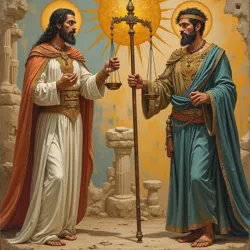Maaldir
Maaldir, originally the god of justice in the Nonet, became a bitter and vengeful deity known as the God of Bitterness after his corruption by the Ravager's death cry. His transformation from an upholder of cosmic law to an agent of retribution marks one of the most dramatic falls among the corrupted gods, second only to Dystus in the severity of his change.
 Ancient mural depicting Maaldir's transformation from Justice incarnate to the God of Bitterness, recovered from ruins in the outer districts of the Omnium Theocracy
Ancient mural depicting Maaldir's transformation from Justice incarnate to the God of Bitterness, recovered from ruins in the outer districts of the Omnium TheocracyOrigins and Early Role
Before his corruption, Maaldir stood as the divine arbiter of justice within the cosmic order established by Uzhyr and Morsvitae. Created by the Lort'zyn along with his eight divine siblings, he embodied the principles of fairness, judgment, and cosmic balance. His original domain encompassed not just punishment, but restoration and reconciliation, making him a figure of both authority and mercy in the early universe.
In his original form, Maaldir worked closely with Gardor, god of resolve, to maintain order across creation. Together they formed a powerful partnership, with Maaldir's sense of justice complementing Gardor's unwavering determination. This alliance would later make their mutual corruption all the more tragic, as both gods fell to darker aspects of their nature.
The Fall to Bitterness
The Ravager's death cry affected each member of the Nonet differently, but Maaldir's transformation was uniquely personal. His fall began with a growing fixation on perceived injustices, particularly regarding Uzhyr's handling of the Ravager's defeat. Where once he sought to balance justice with mercy, Maaldir became consumed by an obsessive need for retribution.
The corruption manifested first in subtle ways - his judgments grew harsher, his mercy scarcer. But as the Ravager's influence deepened, Maaldir's very essence transformed. Justice became vengeance, fairness twisted into spite, and his desire to right wrongs mutated into an all-consuming bitterness that tainted every aspect of his being.
Domain and Influence
After his corruption, Maaldir established the Venue of Righteousness within the Nemither, a realm that serves as both his court of judgment and torture chamber for those he deems deserving of punishment. This domain reflects his corrupted nature, where justice has been replaced by vindictive retribution.
His influence manifests in the material realm through his Retributors, a legion of Tenebric heralds who wield reprisal weapons capable of reflecting damage back upon attackers. These weapons embody Maaldir's philosophy that all harm must be repaid in kind, a perversion of his original principles of proportional justice.
The Bitter Truth
Among the corrupted gods, Maaldir retains the most awareness of his former self, which paradoxically makes his bitterness even more profound. He maintains enough of his original nature to recognize the extent of his fall, yet remains powerless to reverse it. This self-awareness manifests in his creation of the Viziers of Vengeance, major aberrations who serve as both his generals and philosophers, contemplating the nature of justice and revenge.
Role in the War for Eternity
During the War for Eternity, Maaldir plays a crucial role in the dark pantheon's strategy. His encounter with Arkanos during the hunt for the Ravager's components demonstrated both his tactical acumen and his deep-seated resentment toward Uzhyr's creation. By stealing several vital components of the Ravager's corpse, he directly challenged Uzhyr's plans while furthering the dark pantheon's goals.
Legacy and Impact
Maaldir's transformation serves as a stark reminder of how justice without mercy can become tyranny, and how righteous anger, when corrupted, transforms into consuming bitterness. His fall has particular significance for the Vengeful Sages, whose own pursuit of retribution against the Bibliocast Scribes mirrors Maaldir's descent into vengeful obsession.
The god's influence can be seen in the growing tensions within the Omnium Theocracy, where those who seek justice must constantly guard against allowing their pursuit to transform into revenge. This struggle is particularly evident in the actions of the Lawwatch, whose members must balance maintaining order with avoiding the trap of excessive retribution that Maaldir's fall exemplifies.
See Also
- The Dark Pantheon
- The Judgment of Babel
- The Vengeful Path